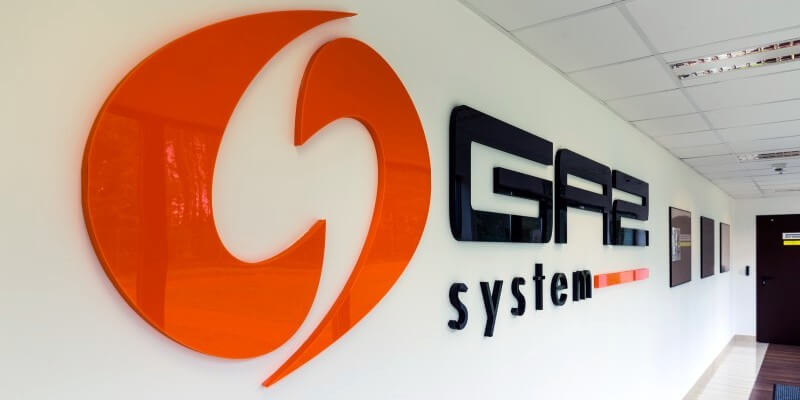During a meeting with journalists and business representatives Ukraine’s Energy Minister assured that from the point of view of Warsaw and Kiev the investments in gas infrastructure that will connect both countries were a „real benefit” situation. However, reality is not as rosy – writes Wojciech Jakóbik, BiznesAlert.pl’s editor in chief.
Ukraine says to stay calm, but experts are warning
On 4 October Ihor Nasalyk, Ukraine’s Energy Minister visited Poland. At a meeting with journalists he talked about the possibilities of cooperation with Polish companies. The visit was overshadowed by Dziennik Gazeta Prawna daily’s report from that day, which said that Poland was buying coal extracted in Donbas, Ukraine’s eastern region, where currently the Ukrainian army is fighting against fighters supported by Russia. When asked about the 11 thousand tons of coal imported from there by Poland, Nasalyk said he was 'sorry’. However, Poles may feel sorry as well.
Poland supports Ukraine’s energy integration with the European Union. Thanks to Kiev’s efforts and Europe’s backing, significant progress has been noted in the gas sector. A few reforms have been conducted, for which Kiev has been regularly receiving financial subsidies from, among others, the International Monetary Fund (IMF), which let it purchase gas in the West. This allowed Ukraine to stop importing the fuel from Russia’s Gazprom in November 2015. About 1 bcm of gas annually reaches the Dnieper River from Poland via PGNiG.
Ukraine pumped 8.5 bcm of gas into its storage facilities. This is a 44% increase in comparison to the same period last year. This was possible thanks to importing 10.7 bcm of gas from the European Union. The volume is 70 percent higher than it was last year at the same time. Gas consumption decreased by 0.5 percent in comparison to 2016.
The substantial gas reserves amassed for the winter will ensure that pressure in Ukraine’s gas pipelines will not drop, and that there will be no shortages on the market, or problems with gas transmission from Russia to the European Union. Contrary to the autumn of 2014 and 2016, the Russian press has so far not written any alarmist articles about an impending gas crisis by the Dnieper river.
BiznesAlert.pl is up-to-date with the progress in Ukraine. Despite the successes, setbacks have also occurred. They have been reported about with increasing criticism by the press, and analysts have been warning about them as well. When asked about them, Nasalyk assured our journalist that there was no reason for concerns. It was not an honest answer.
Poland may benefit from investments in Ukraine’s gas sector, including the transmission infrastructure, provided the situation by the Dnieper is stable. This could be guaranteed only if the reforms required by the European Commission and the IMF are continued as a prerequisite for further financial assistance.
The reform of the Naftogaz company, which owns Ukrtransgaz, is yet to be completed. The ownership unbundling and new corporate standards have not been introduced despite the fact that both are required by the EC and the IMF to sustain the bankrolling. The money actually makes it possible to purchase gas in the West instead of from Gazprom.
The issues surrounding the reforms are hindering the development of promising initiatives – the Northern Gate, at the LNG terminal in Świnoujście and the planned Norwegian Corridor (Baltic Pipe), which is based on, among others, Ukraine’s market. They also harm the security of investing in Ukraine’s gas transmission pipelines, some of which are to be privatized.
Reform stagnation
An analysis prepared by Wojciech Konończuk and Sławomir Matuszak from the Centre for Eastern Studies in Warsaw does not encourage investments. The authors claim that there is a dispute over the reforms in Kiev where, „on the one side there is the widely-understood ruling camp (president’s and prime minister’s inner circle), and on the other Naftogaz’s reformative management board led by Andriy Kobolyev and supported by western institutions.”
„It is clear that the government wants to regain full control over Naftogaz, including financial transfers to the company’s subsidiaries. The ongoing conflict has caused the gas sector reform to stagnate for over a year now,” the authors wrote. In their opinion the government in Kiev has started to limit the power of Naftogaz’s management. „During the past few months international institutions (e.g. EBRD in August and IMF in September), have criticized Kiev a number of times for delaying the gas reform and have clearly warned its implementation may regress. Most of all, they pointed to the fact that the government wanted to maintain full control over the gas sector companies by putting a stop to the process of expanding the competences of the companies’ management bodies, which would limit the government’s power to interfere with their decisions,” the analysis said.
The Centre’s analysts underscore the fact that Naftogaz’s unbundling has not been progressing and that an independent supervisory board for the Main Gas Pipelines of Ukraine (MGU) has not been elected yet. MGU is the newly created company that is to take over the management of gas pipelines from Naftogaz.
The experts also write that the reform to liberalize gas prices has been abandoned. „The adopted formula says that as of this October the price should be increased by 17 percent. This demand has been made not only by Naftogaz, but mostly by the IMF as it is one of the conditions for granting another tranche of the loan. However, Prime Minister Volodymyr Groysman said there would be no price hike, whereas Ihor Nasalyk the Energy and Coal Industry Minister allowed the possibility of a price decrease,” the analysis says.
„The actions taken by the government in the past few months, including blocking the transfer of competences currently held by the government to the gas companies, in reality mean that the Naftogaz reform has been halted and that the authorities are striving to retain control over Ukraine’s biggest taxpayer. These actions go against the key requirements of the gas reform,” conclude the Centre’s experts.
Buying support before elections?
Timothy Ash has not spared criticism in his article for the Kyiv Post against Petro Poroshenko’s people, whom he accuses of cynically avoiding IMF’s reforms before the upcoming elections to win a better result. The daily quoted Ihor Nasalyk who said that the government would not increase gas prices for households. However, this was a condition for further cooperation made by the IMF after a review planned for the end of 2018. The subsidies for gas bills offer a relief to the citizens and politicians counting on their votes, but they put a strain on Ukraine’s budget.
Even though Naftogaz announced it was preparing for unbundling and a management reform, the lack of progress regarding gas prices liberalization may block the reform required by the IMF. Timothy Ash suggests that Petro Poroshenko’s administration was more interested in getting reelected in the 2019 presidential elections.
The reporter reminded that in turn for liberalizing gas prices for households, the IMF has already transferred a part of over USD 8.5 bn to Ukraine. The money is used, among others, to purchase gas from non-Russian sources. This allowed Kiev to stop buying Gazprom’s gas in November 2015. „(…) is the government serious now of continuing with the reform effort, or just playing the IMF, and the markets, for fools?,” Ash asks. He also reminds that other projects, including pension, anti-corruption and land reforms, are yet to be conducted.
According to the author, Poroshenko’s ambivalent position could be explained by the fact that at the end of August the budget had a record-high surplus of UAH 38.5 billion. This is an increase in comparison to a deficit of UAH 42.9 billion in the same period last year. The budget income grew by 46.1 percent, while spending went up by 21.3 percent „only”. These results are accompanied by a higher GDP growth and improved tax compliance and Naftogaz’s increased dividend.
Ash states that this is how Kiev earned additional tens of billions, which now allow it to abandon the reforms required by the IMF and give up on the next loan tranche. This would make it possible to avoid the unpopular changes in the gas sector. „I think that is a shame, as it likely means that key structural reforms will be put on the back burner, in the short term electoral interests of the Poroshenko administration,” the reporter sums up.
Telling the truth
Ukraine cannot expect that its western partners, such as Poland, will overlook its internal problems and invest blind. Cooperation with PGNiG and Gaz-System’s investments are impossible without reforming the gas sector. Such a risk is too big for Polish investors. The reform has to be continued despite the oligarchs’ resistance. If the power sector reform continues to be in even more disarray than the changes in the gas sector, it will be also impossible to cooperate within that realm and to pursue Nasalyk’s idea, who invited Poland to invest in the Chmielnicki nuclear power plant. This project will be also problematic from the point of view of the Polish power sector’s priorities which is interested in incidental imports of energy from Ukraine only, as it hopes to stick to its own power generation that is to be increased.
Friends can afford to be blunt. If Ukraine does not implement the reforms, it will lose credibility in the West where its advocates, including Poland, will find it harder to defend it against the criticism of its partners that are located further away from the Dnieper, and who are only waiting to withhold the support and withdraw the sanctions against Russia. The fact that a war is being waged in Ukraine should encourage the West to increase its efforts to stabilize the situation in the eastern part of the country, which in turn is necessary to convince Ukraine that the reforms will pay off in the future. This is how the West is sharing responsibility for the future of the country. However, without the reforms it will have to limit its assistance. At the same time Poland will not have any arguments to sustain the support. The situation will also force Warsaw to review its cooperation in the gas sector even though in theory it is very profitable.






